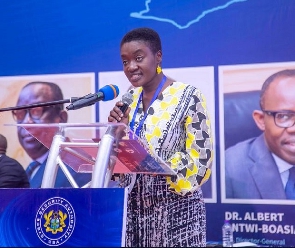 Deputy Minister of Communications, Ama Poma Boateng
Deputy Minister of Communications, Ama Poma Boateng
Deputy Minister of Communications, Ama Pomaa Boateng has emphasised on the relevance of ICT skills to bridging Ghana’s knowledge gap, especially among young girls. According to her, the Information and Communications Technology (ICT) space has the potential to provide both women and girls with the requisite training to accelerate digitalization efforts in Ghana and the world at large. Speaking at the second edition of the 'Seeds for the Future' programme facilitated by Hauwei in Accra, the deputy communications minister urged young women and girls to take a keen interest in Science, Technology, Engineering, and Mathematics (STEM) to improve their knowledge and skills. “The 4th Industrial Revolution (4IR) beacons, all hands are needed on deck to fully realize the potential of digitalization and its resultant effect on the Ghanaian economy. This calls for motivating and inspiring our youth to embrace ICT education, equipping them with the digital skills they need to thrive in the 21st century and creating more employment through direct jobs and entrepreneurship,” the deputy minister explained. “It is in line with this that the Ministry of Communication under its Girls-In-ICT initiative partnered with Huawei to train and empower more girls in digital technologies. I am glad to say that through this fruitful partnership, we successfully trained over 12,000 Senior High School girls in Privacy Protection and Cyber Security this year,” she added. Ama Pomaa Boateng however encouraged Ghanaian participants of this year’s 'Seeds for the Future' programme to remain poised about learning cutting-edge technologies and other industry trends. “Pairing with countries like Iceland, Finland, Sweden, Norway and the Baltics we expect you to effectively take part in the training and represent Ghana positively, portray remarkable leadership traits set good standards and place Ghana on top of the Seeds ladder,” the deputy minister stressed. Meanwhile, Deputy Managing Director of Huwaei, Kweku Essuman Quansah in his remarks recounted that in 2021, some 60 female tertiary students across top universities in Ghana had benefitted from the “Seeds for the Future Program” and therefore encouraged others to take advantage of the learning opportunity. “I am again, proud to say that through such collaborative work, three (3) of our best participants who represented Ghana at the Regional Tech4Good Competition came second, among fierce competition from the men. This achievement by the girls is evident that the seeds we sowed last year, have started bearing good fruits," he noted. Meanwhile, this year’s edition of the programme will have 50 top female tertiary students who will embark on an intensive 8-day virtual training. The students will be introduced to advanced ICT courses in the areas of Artificial Intelligence, 5G, Cloud Computing, Digital Power, Digital Trade, Smart City and IoT whiles building their leadership capabilities in courses like Strategic Leadership and Cross-Cultural Management. MA/FNOQ
Deputy Minister of Communications, Ama Pomaa Boateng has emphasised on the relevance of ICT skills to bridging Ghana’s knowledge gap, especially among young girls. According to her, the Information and Communications Technology (ICT) space has the potential to provide both women and girls with the requisite training to accelerate digitalization efforts in Ghana and the world at large. Speaking at the second edition of the 'Seeds for the Future' programme facilitated by Hauwei in Accra, the deputy communications minister urged young women and girls to take a keen interest in Science, Technology, Engineering, and Mathematics (STEM) to improve their knowledge and skills. “The 4th Industrial Revolution (4IR) beacons, all hands are needed on deck to fully realize the potential of digitalization and its resultant effect on the Ghanaian economy. This calls for motivating and inspiring our youth to embrace ICT education, equipping them with the digital skills they need to thrive in the 21st century and creating more employment through direct jobs and entrepreneurship,” the deputy minister explained. “It is in line with this that the Ministry of Communication under its Girls-In-ICT initiative partnered with Huawei to train and empower more girls in digital technologies. I am glad to say that through this fruitful partnership, we successfully trained over 12,000 Senior High School girls in Privacy Protection and Cyber Security this year,” she added. Ama Pomaa Boateng however encouraged Ghanaian participants of this year’s 'Seeds for the Future' programme to remain poised about learning cutting-edge technologies and other industry trends. “Pairing with countries like Iceland, Finland, Sweden, Norway and the Baltics we expect you to effectively take part in the training and represent Ghana positively, portray remarkable leadership traits set good standards and place Ghana on top of the Seeds ladder,” the deputy minister stressed. Meanwhile, Deputy Managing Director of Huwaei, Kweku Essuman Quansah in his remarks recounted that in 2021, some 60 female tertiary students across top universities in Ghana had benefitted from the “Seeds for the Future Program” and therefore encouraged others to take advantage of the learning opportunity. “I am again, proud to say that through such collaborative work, three (3) of our best participants who represented Ghana at the Regional Tech4Good Competition came second, among fierce competition from the men. This achievement by the girls is evident that the seeds we sowed last year, have started bearing good fruits," he noted. Meanwhile, this year’s edition of the programme will have 50 top female tertiary students who will embark on an intensive 8-day virtual training. The students will be introduced to advanced ICT courses in the areas of Artificial Intelligence, 5G, Cloud Computing, Digital Power, Digital Trade, Smart City and IoT whiles building their leadership capabilities in courses like Strategic Leadership and Cross-Cultural Management. MA/FNOQ